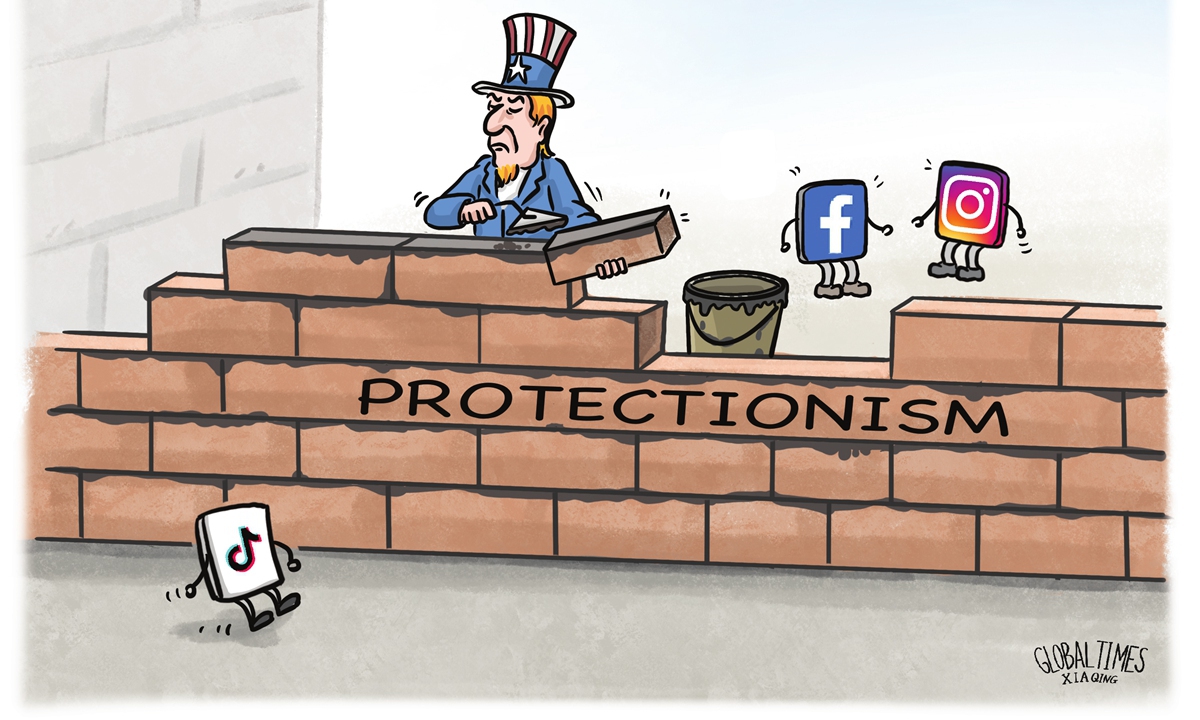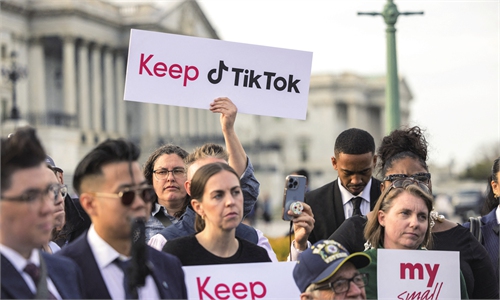
Illustraion: Xia Qing/GT
Owners of Chinese apps - which are popular in the US market - are trying their best to ensure compliance with US rules, but there is still concern that no matter how well prepared they are, it will be hard for them to cope with US laws and regulations specifically targeting Chinese companies.Temu, PDD Holdings' overseas budget shopping app, is looking to hire a compliance officer to help with compliance issues in the US, showed its job ads, as the Reuters reported on Tuesday.
The development came at a time when US lawmakers scrutinized the Chinese company for allegedly lax practices and policies related to blocking goods from the Northwest China's Xinjiang region and other US lawmakers introduced a bill to restrict the "de minimis" tariff exemption widely used by e-commerce sellers, a move observers believed aimed at curbing Chinese online shopping platforms.
Yet, despite the headwind from the US policy climate that is widely seen as unfriendly to Chinese companies, some Chinese apps have skyrocketed in popularity among American users. Four out of the top five most-downloaded apps in the US are Chinese apps, namely, online shopping app Temu, social media app TikTok, video editing app CapCut, and Chinese fast fashion app Shein, the SensorTower's Store Intelligence Data Digest Q1 2023 Report showed in May. When it comes to the Apple App Store ranking, as of late May, Temu had the No.2 spot among free apps, while CapCut and TikTok held the fourth and fifth spots. Shein was at fourteenth.
If anything, the success of some Chinese apps in the US could be seen as a microcosm of China-US cooperation in terms of app development, to a certain extent.
American tech giants like Apple have boosted the development and education of app developers in China over the years. Last year, Apple's iOS app ecosystem had more than 5 million third-party developers in China, a double-digit growth from the 4.4 million in the previous year.
The sheer size of Chinese professionals has made China's app development one of the most prosperous and innovative sectors in the world. Only the best app development teams can survive the fierce competition in China and even expand overseas markets.
Technological advantage is only one reason why Chinese apps have grown successfully in the US. Another important reason is that these popular Chinese apps often fit the needs of the US internet market and exploit its market potential, which is conducive to the development of the US internet economy.
Of course, to develop in the US market, Chinese app companies must ensure compliance with US laws, regulations and rules. There is every reason to believe that they won't underestimate the importance of compliance and will attach great significance to the issue. And we also have the confidence that those that can stand out in the fierce competition in the Chinese market must be able to withstand the investigation by US authorities.
Nevertheless, it doesn't mean US lawmakers can make unreasonable demands of Chinese companies, such as forcing the sale of TikTok, and citing unfounded political reasons like concerns over national security. And now whether the US will treat Chinese companies with a political and ideological approach that goes beyond the law and undermines the order of a market economy with fair competition has become a major concern. If so, it would be the "non-compliance" with market rules by the US side and it would discredit the US market.
Apple's entry into the Chinese market has promoted the development of related application development industry, and Chinese apps are now popular in the US. This is a typical demonstration of China-US cooperation pointing to common development and mutual benefits.
If some politicians in Washington only focus on suppressing Chinese apps and making way for American companies, it will not only derail the development of tech sector cooperation between the two countries, but also deprive the US of the opportunities to boost its own internet economy.
As Chinese apps are originally developed through cooperation, we understand the importance of cooperation, and the US needs to have a correct approach toward the internet economy development. Using irrational means to stifle Chinese apps may not be beneficial for US companies' development and cooperation in China and around the world ultimately.



